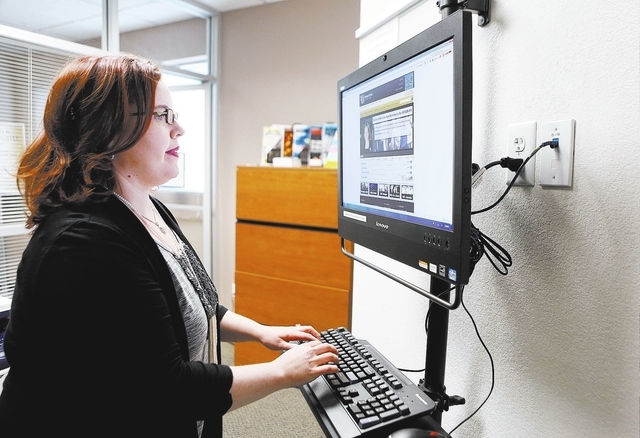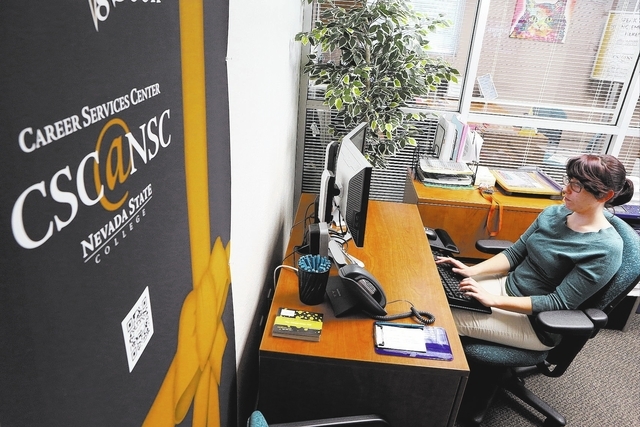Student service centers providing guidance for new, graduating students
Megan Gregory, a 21-year-old transfer student at Nevada State College, used to think that she’d someday use a nursing degree to work in a hospital or a doctor’s office.
Then she met Cindy Stella, the director of Nevada State College’s new Career Services Center, which opened this fall. “The more I talked to Cindy, the more I realized you can go out and do anything in the world with nursing. You can work for law firms and help with medical lawsuits. You can work in marketing.”
Gregory’s plans for the future include joining Doctors Without Borders and traveling the world. But for the moment, in addition to her nursing studies, she’s joined Stella at the 11-year-old school’s first career center, working as a career aide. She and one other aide are available to assist the school’s 3,400 students and nearly 1,000 alumni in hatching career plans, landing jobs and accomplishing dreams.
“I put in as much as I can, 150 percent, because I want 100 percent of our students who have a goal to reach it,” said Stella, who envisions herself as a catalyst — with a “Rolodex” in her head of recruiters and companies to match up with something that she recognizes in a student.
Gregory recently had a friend come talk to her at the center about the bind she was in: graduating in the spring but uncertain of what to do careerwise with her psychology degree.
“Cindy came in and did some brainstorming and mentioned something that my friend really liked, which is working with marketing,” she said. “Going in with a psychology degree to help companies target their audience, and make whatever they’re selling or endorsing more appealing to different audiences.”
But opening doors of perception is only the beginning of Stella’s mission. Her goal is to give career seekers tools for the rest of their lives, whether they’re applying to graduate school or riding the wave of an uncertain economy.
“Their college experience is not only getting what’s in the classroom, but also getting all those life tools,” she said. She supplies resources and samples, does first-edit drafts on resumes and cover letters, and explains why she’s made changes, hoping, for example, to provide the “lens” of a recruiter. Add to that, a whirlwind of seasoned advice about tried and tested job-hunting websites, as well as the new and intriguing, including aftercollege.com, a job board featuring exclusively entry level positions, “perfect for the new grad,” she added enthusiastically.
But with almost 60 employer relationships already in tow, and a recently launched online system that runs all job postings and assists with other initiatives, Stella isn’t stopping at websites. At the grass-roots level, she hopes to do more outreach to small and midsized businesses, which she believes are doing more hiring.
And, she’s pushing seekers to get away from the computer at times and take advantage of networking opportunities, such as Nevada State College’s partnership with Dress for Success Southern Nevada, an organization that supplies women with interview and work wear that they might not be able to afford otherwise, in addition to career development tools and support. While some students take advantage of the clothing options, Stella refers others to build their careers through volunteerism and community involvement, and access to board members who are community movers, shakers and role models.
That pounding-of-the-pavement beat echoes, as well, in some other Nevada institutions’ career services, which are making a comeback after budget cuts. They’re also demonstrating just how resilient and proactive the art of college career counseling has become.
At the University of Nevada, Reno, Career Exploration Coordinator Mary T. Calhoon is overseeing the new Nevada Career Studio’s efforts to grab the attention of students and businesses alike. The studio opened on Oct. 2. It’s a far cry from the budget cuts of 2009, which, Calhoon said, wiped out the original career development office. A tuition increase paid for the new studio, she explained.
“I do think that the scope of career services has changed, and I think that we have a unique opportunity ahead of us, because we are really in a rare position to get to start a career office from the ground up,” she said.
One goal is to show the community what the university’s liberal arts students are made of. According to 2013 data she cited from the National Association of Colleges and Employers, “effective communication is the No. 1 transferable skill, the No. 1 soft skill that employers are looking for. They need students who can communicate effectively in writing, communicate effectively verbally. They need students who can write and communicate for social media, and market. We have students at this campus who are great at those things. And we’re helping companies realize just the scope and the depth of the talent we have on campus.”
While the studio has already had hundreds of visits during drop-in hours, not including participation in workshops, according to Calhoon, it’s also made its way directly to students via dorm room and classroom presentations, and presentations to new students and their parents at new student orientations throughout the summer.
“Pop-up shops” have been a favored arrow in the quiver — having companies set up “shop” right in front of the Student Union or the Knowledge Center, in the midst of campus action.
“We’ve had companies even offer jobs on the spot,” Calhoon said.
College kids aren’t the only ones benefiting from that proactive spirit. Raelynn Frazier Lee is interim director of University of Nevada, Las Vegas’ Career Services, which were also scaled down by budget cuts. But that hasn’t stopped Career Services from offering assistance to alumni laid off during the recession, after years in one career, she said. Services are free of charge to alumni, with the exception of the job search database, which is accessible with membership in the UNLV Alumni Association. Many employers posting on the database are looking for UNLV grads, she emphasized.
“What we know about the 21st century workforce is that we’re trending away from one career that lasts 35 to 40 years,” she pointed out. “Instead, we’re looking at more like having three to four careers over our work life span, ranging from 10 to 15 years.”
Teaching alumni how to ride that wave without taking it personally is part of the counseling process.
Building, and sometimes, reshaping a career as if it were an art form may be one way to circumvent the fear.
“We’re called the ‘Career Studio’ for a reason,” Calhoon said. “It’s about students having a space to put in the time, put in the work, to manage their careers and figure out what their dreams are.”



















